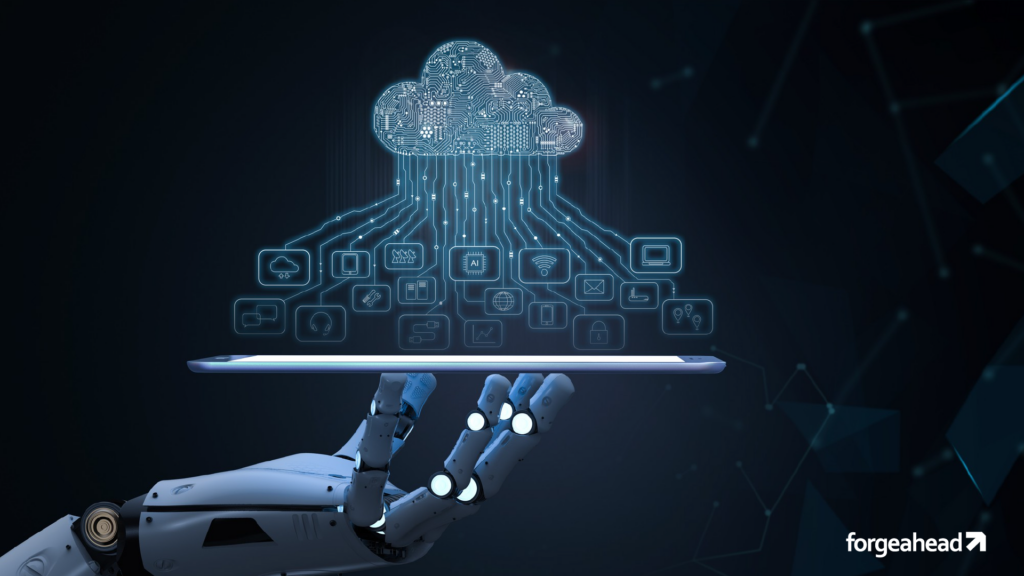Last updated on October 22nd, 2024
With 85% of businesses worldwide implementing or experimenting with artificial intelligence (AI), it’s evident that we’re witnessing a significant technological shift.
As cloud computing in AI becomes increasingly essential, businesses worldwide are taking note. The combination of AI with cloud computing stands as a transformative force, poised to redefine the technological landscape.
In this blog, we aim to untangle the complexities and capture the opportunities at the intersection of AI and cloud computing.
From addressing integration challenges to optimizing data management and ensuring robust security, this blog serves as a guide for those at the forefront of adopting these technologies.
We will talk about strategies, best practices, etc. that highlights the immense potential of AI-enhanced cloud solutions, all while considering the essential balance of innovation with cost, security, and compliance requirements.
The Convergence of AI and Cloud Computing
Defining the Foundations
Artificial Intelligence (AI) is the simulation of human intelligence processes by machines, especially computer systems. These processes include learning, reasoning, and self-correction. AI has the unique capability to analyze vast amounts of data, identify patterns, and make decisions with minimal human intervention.
Cloud Computing, on the other hand, is the delivery of computing services—including servers, storage, databases, networking, software, analytics, and intelligence—over the Internet (“the cloud”) to offer faster innovation, flexible resources, and economies of scale. It allows businesses to avoid or minimize upfront IT infrastructure costs and focus on projects that differentiate their businesses and drive mission-critical objectives.
Powering the Future: AI Meets Cloud Computing
The fusion of AI and cloud computing is sparking an era of technological breakthroughs. Businesses harness AI’s ability to process and analyze data alongside the cloud’s scalable infrastructure, offering access to advanced AI tools without hefty initial investments.
This partnership boosts efficiency and spurs innovation across sectors. Healthcare uses AI for predictive patient care, while finance detects fraud in real time through AI algorithms.
This blend is reshaping technology’s role, creating a nimble, forward-thinking business world ready to meet evolving market demands and consumer needs.
Integrating AI with cloud computing opens doors to growth and innovation, revolutionizing industry operations in our digital era.
Challenges and Opportunities in AI and Cloud Computing Integration
AI in cloud computing is not just a trend; it’s a strategic evolution that’s redefining operational efficiencies and innovation capabilities. Integrating AI with cloud computing brings transformative opportunities and challenges for businesses.
Here’s a streamlined look at these challenges and the opportunities they offer:
Navigating these challenges is key to leveraging AI and cloud computing’s full potential, driving operational efficiency, security, and competitive edge.
The Power Pair: AI and Cloud Computing
Imagine AI and cloud computing as a dynamic duo, each boosting the other’s strength.
AI thrives on the vast resources the cloud offers, like endless data storage and computing power.
This means AI can sift through massive amounts of information more swiftly, making smarter decisions along the way.
Transforming Cloud Computing with AI
When AI meets cloud computing, magic happens:
- Efficiency: AI is like a smart assistant for the cloud, ensuring resources are used just right — saving money and reducing excess.
- Automation: Imagine the tedious tech tasks getting done on their own. AI automates everything from backing up data to enhancing security, cutting down errors and freeing up time.
- Innovation: AI injects cloud services with new features, like being able to predict what your business needs before you even know you need it, or offering smart chatbots that improve customer service.
This blend of AI and cloud computing is revolutionizing how businesses use technology, turning cloud platforms into hubs of endless innovation and making them more powerful tools that help push businesses forward into the future.
Winning with AI and Cloud: How to Get It Right
One of the key challenges in migration services in cloud computing is ensuring seamless integration of AI technologies into existing cloud infrastructures.
Partnering with the best cloud computing service providers that offer specialized cloud-based AI services ensures a smoother integration and leverage of AI capabilities.
Merging artificial intelligence (AI) with cloud computing opens up exciting possibilities for businesses, turning them smarter and more efficient. Here’s how to make sure you’re doing it right.
Make Them Work Together Smoothly
- Pick Compatible Tools: Just like making sure your puzzle pieces fit, ensure the AI tools you choose work well with your cloud platform. This smooths out data sharing and processes.
- Go for Growth: Choose cloud services that can grow with you. As your AI ambitions expand, your cloud setup should be able to keep up without skipping a beat.
Choose the Best Teammates
- Look for AI Pros: When picking cloud service providers, go for those who know their AI. The right ones will have the tools and the brains to guide you well.
- Smart Migration Matters: Moving to AI-powered cloud computing? Pick migration services that make the transition as smooth as a well-oiled machine, minimizing bumps along the way.
Boost Your Cloud with AI
- Smart Analytics: Use AI to get a bird’s-eye view of how you’re using your cloud resources. It can spot trends and predict needs, helping you use resources wisely.
- Automate to Save Time: Let AI take over the routine tasks, like allocating resources or scheduling backups. It’s like having an efficient assistant, saving you time and enhancing reliability.
Following these steps can help businesses integrate AI with cloud computing effectively, boosting efficiency and paving the way for new innovations. It’s all about making smart choices and letting technology do the heavy lifting, setting your business up for a bright digital future.
Navigating the Security Landscape
Integrating AI into cloud computing introduces unique security challenges and compliance requirements, especially as AI applications often process sensitive and personal data.
Ensuring robust encryption for data in transit and at rest, implementing strict access controls, and conducting regular security assessments are fundamental to protect against breaches and vulnerabilities.
Platforms like Amazon AWS cloud computing are at the forefront, demonstrating robust security measures for AI-driven applications.
Additionally, compliance with regulations such as GDPR and HIPAA becomes paramount to safeguard privacy and integrity.
Strategies for Enhanced Protection
Mitigating these risks involves adopting a multi-layered security approach, including advanced threat detection powered by AI itself, to identify and neutralize threats proactively.
Regularly updating AI models and cloud platforms ensures defenses remain effective against evolving threats. Transparent data governance policies and adherence to compliance standards are also crucial for maintaining trust and legal conformity.
The fusion of AI with cloud computing brings forth substantial benefits, notably improved operational efficiency through automation and optimized resource management.
AI enhances decision-making by providing deep insights from big data analytics, enabling businesses to predict trends and adapt strategies swiftly. Moreover, AI-driven personalization elevates user experiences, offering tailored services that meet individual preferences and needs, fostering loyalty and satisfaction.
Shaping the Future of Integration
As we look towards the future, several emerging trends are poised to redefine the AI and cloud computing landscape.
Edge computing, by processing data closer to the source, reduces latency and bandwidth use, complementing cloud capabilities with faster responses and real-time analytics. Hybrid cloud models offer the flexibility of combining public and private clouds, catering to varied business needs and compliance requirements.
AI-driven automation continues to advance, promising more intelligent, self-managing cloud environments that optimize operations and security. These developments signify a shift towards more agile, efficient, and secure AI and cloud computing ecosystems, heralding a new era of digital innovation.
Embrace the future with confidence and curiosity—Forgeahead is here to guide you every step of the way.



